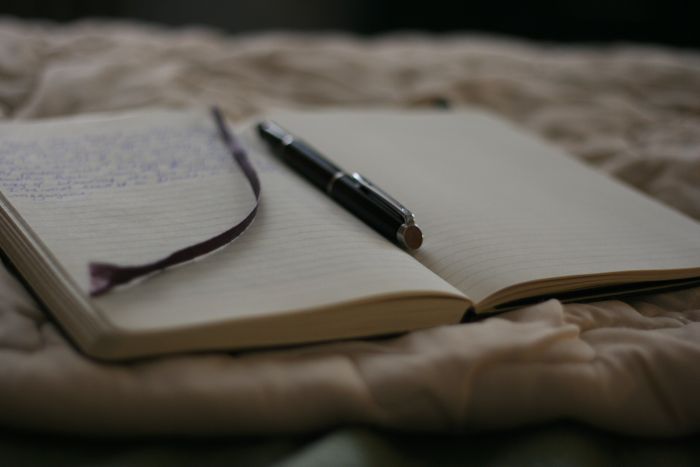Find out about The Open University's English courses

- Just do it. Forget about procrastination. The time is now. Write early in the morning, before you have time to distract yourself with self-doubt and Twitter. Write the first thing that comes into your head, and don’t stop for at least 20 minutes. After that, you are more likely to carry on. Then do the same thing tomorrow. It really is that simple.
- Get a cat. Muriel Spark, author of The Prime of Miss Jean Brodie believed that a contented cat was a great aid to the deep concentration needed for novel writing. It works like this – the cat sees your desk lamp, decides it’s a good place for a nap, and settles down happily while you work. ‘Its presence alone is enough,’ Spark said. ‘The effect of a cat on your concentration is remarkable, very mysterious.'
- Record your thoughts. This is where your ideas must go. As soon as you think of something, get it down. It doesn’t have to be a traditional paper notebook (though these are wonderful things). You can use your phone if you would rather. But Get It Down – forgetting that great idea for chapter three that you had in the supermarket queue is so frustrating. And often those ideas have gone for good.
- Pretend to be Jack Kerouac. Possibly the Grandfather of NaNoWriMo is Jack Kerouac, who wrote his seminal novel On the Road in just three weeks (on a 120-foot scroll of paper). Self-doubt was not a problem for Kerouac. He included 30 writing tips in his barely coherent Belief and Technique for Modern Prose, one of which was ‘You’re a Genius all the time’. (It’s worth bearing in mind that Kerouac also thought editing was for wimps and the first draft could not be improved on. Not a good look for those of us seeking publication in the 21st century.) But you may as well be a genius for the next 30 days, at least.
- Harness your obsessions. We are all hung up on something – the terrible ex, the neighbours from hell, mothers, spiders, fitting rooms, flying or being alone. Anything you like. Some of the best stories come from the deepest and darkest obsessions (just ask Alfred Hitchcock). So dig deep and find your own personal heart of darkness.
- Learn by doing. Studying creative writing is very useful – but don’t allow yourself to be a slave to someone else’s technique. There is no right or wrong way to write a novel, and you have yet to discover the method that works for you. This relates to your working methods and the way you use your time. You might be a plotter or a splurger, a night writer or a creative lark who leaps up at dawn to start a new day’s work. There is only one rule – you must write a lot, as often as you can.
- Be a health nut. There are a lot of myths about writing – one of them is that of the drug-fuelled genius, penning the masterwork while downing the absinthe. Do not go there. If you want to have a glass of wine or two at the end of a writing day, fine. But nurturing your brain makes more sense. Your imagination is more likely to be fired by a run, walk or swim. Not only does it get the endorphins racing round your system and increase your motivation, it boosts your mental function.
- Escape from words. The trouble with writing a novel is that once you have got over the procrastination stage, it’s tempting to swing the other way and become obsessed with the work in progress. Then, to relax you, er... read a book. You may need to read to feed your imagination, but find ways of getting right away from the written word. It’s just a symbol, after all, one way of communicating reality. Watch films, listen to music, go to art galleries. Look at the way in which other artists channel and shape their experience.
- Be Zen. Projects like NaNoWriMo are great for motivation, but a month of non-stop writing can feed into the notion that producing a novel is a manic and insatiable activity, and that the best way to resolve this is to do everything as fast as possible. Writing is like dieting – crash diets can make your fatter, not thinner and if you think you can write a novel in a month, you will be disappointed. Get those 50,000 words down, but remember that this is just the beginning. And...relax.
- Enjoy yourself! The act of writing, inventing and crafting, is the most magical part of a writer’s life. It’s a great privilege to work in this way, and it can transform you perceptions. Publication may follow, but your book will never belong to you in the same way again. So live in the moment, and let your novel take its course. Cherish this phase, learn to love your book and the rest of your life will suddenly make sense.



Rate and Review
Rate this article
Review this article
Log into OpenLearn to leave reviews and join in the conversation.
Article reviews